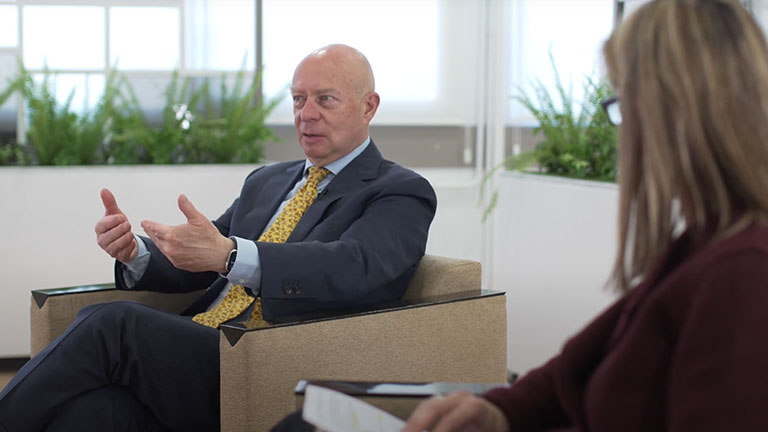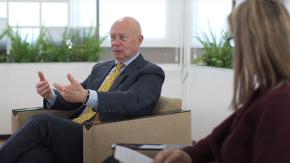
"You have to add value to be able to prove your existence and prove that you’re valuable for the world”

"You have to add value to be able to prove your existence and prove that you’re valuable for the world”
Social 27 April 2022
The economy, in its essence, needs to serve communities and citizens. This mantra is the bottom line for Marcello Palazzi to explain how companies and organizations should make the wellbeing of people and the planet their priority. Business schools also have the responsibility to train responsible leaders leading these organizations.
Cristina Giménez, Director of Identity and Mission at Esade, talks about the social role of organizations and how they can contribute to preserve our planet with Marcello Palazzi, Co-founder and global ambassador of B Lab.
TRANSCRIPT:
Cristina Giménez: We are going to have a conversation with Marcello Palazzi. Thank you, Marcello, for being here with us today.
Marcello is a social entrepreneur. His Progressio Foundation has completed more than 300 entrepreneurial projects and initiatives in more than 33 countries. He is also the co-founder and global ambassador of B Lab. We’re going to talk to him about entrepreneurship, ethical values and the urgent agenda to transform our businesses and economy.
Thank you, Marcelo.
Marcello Palazzi: Thank you, Cristina.
Cristina Giménez: How do entrepreneurship and ethical values work together to promote human progress?
Marcello Palazzi: So, when I started Progressio 32 years ago, I looked for the language… And, for me, the language came from Aristotle and Greek philosophy. On the one hand, there is ekonomia, which is the good management of the household and which, today, is the good management of the planet, the world, the globe. And, secondly, there is eudaimonia, which is about wellbeing, human wellbeing. So, I kind of translated those into what I call the “civic economy”. At the heart of “civic” are citizens, communities. So, the economy, in its essence, needs to serve communities and citizens. So, the connection with ethical values is… The moment you talk about citizens and people and communities, it’s basically about providing wellbeing for people and the planet. The planet doesn’t need us, you know? But we need the planet to be able to survive. We also need to have reverence and respect for the planet. So, this, for me, is the conjunction.
Cristina Giménez: You defend an urgent agenda to regenerate our planet. How can firms and the economy be transformed towards a regenerative system?
Marcello Palazzi: Regeneration goes beyond sustainability. So, the real need is to regenerate, to replenish, to rebuild not only because nature needs to be respected and rebuilt but, also, because we need nature to survive. So, one thing I learned recently is that, in fact, if you look at soil, the soil, even less than 1 meter of soil, is where all the nutrients are for our food, and soil is very heavily degraded around the world, you know, because of fertilisers, because of monocropping, and so on. So, just soil… Without soil, we don’t eat. It’s very simple. So, we need to be able to create an agriculture that is regenerative to be able to have soil that is rich enough in organic material to ensure our livelihood. So, “regeneration” is a big word, and it’s also meant to be regenerating our systems, our laws, our institutions, regenerate our fiscal systems, our universities… Because this is like a civilisational transformation. We need to really build a new civilisation, and, so, it’s a big thing. We need to rethink and redesign a lot of the systems and the frameworks within which we work. This is how the economic system and businesses need to regenerate as part of this wider regenerative transformation.
Cristina Giménez: Ok, talking about that, how do you think firms, organisations can contribute to that? For example, how can they contribute to objectives such as eradicating poverty, preserving ecosystems or building strong communities? How do you think organisations can contribute to that?
Marcello Palazzi: In terms of language, organisations may also include other than businesses. So, It’s clear that not-for-profits, philanthropies, they are, at least by definition, already doing good. They exist to do good. Businesses, because the assumption is that they’re for profit, and the profit motive can often obscure or, in a way, negate the other objectives... That’s the real question. This is also why we started, why me and my colleagues started the B Corp movement which is about companies that are for profit and also for benefits, in other words, with a positive impact. So, whatever you do, it has to show that there is a “plus” value. You have to add value to be able to prove your existence and prove that you’re valuable for the world. The shift is to stop doing things that are degenerative in energy, in transportation, in buildings, and shift towards a more regenerative model. This is happening and it can scale. And, the objective is how to scale it fast enough in the next 10, 20, 30 years.
Cristina Giménez: What values would define a leader that is able to balance that challenge of climate emergency, climate change and, at the same time, the economic transformation that it requires?
Marcello Palazzi: So, I sometimes use a slide which has two photos: one is Steve Jobs, and one is Jane Goodall. And, I say, you have to be both. You have to be very entrepreneurial, very creative and, at the same time, you have to be aware, understand, know and be sensitive enough to these sort of human, social and environmental challenges. So, it’s not an “either/or”, for me. I think I’ve learned over the years that it isn’t a binary thing; it’s… Sometimes I say it’s ambidextrous. We need to keep the values and the attributes of a good entrepreneur and good business leader. Absolutely. At the same time, the context requires knowing what the social, environmental and human challenges are, because then you can create solutions. So, a business is a solutions machine. You create solutions for these challenges.
Cristina Giménez: Thank you, Marcello. One more question: What do you think would be the role of business schools like ours in the training or education of these types of professionals?
Marcello Palazzi: The real role is to be ahead, a little bit ahead; you don’t want to be too ahead of this transformation because the transformation is a shift from a more, kind of, extractive economic system, capitalism, to a more generative system. So, you want to be in that journey. It takes leadership and courage to do that. I think the real challenge is to have a renewal process, so you have younger staff, making it a bit easier sometimes to hire people, because you always have to have a PhD and all these kinds of academic credentials. They’re important but they’re not enough. And, existing faculty also need to regenerate. So, renew the know-how, the knowledge base and then, secondly, I would say, be a bit more experimental in the programmes that you develop, including the alumni, the companies, at least, inspiring companies that are already doing work in this area. Some are B Corps; some are… They could be B Corps and others. So, it’s also actively choosing the role models and those companies that are really inspiring because they’re going in this direction. And, at the same time, you know, moving away from… Don’t be shy to move away from those companies that are not representative of this transformation. Because, in the end, it’s a systemic change. You need the ecosystem, not only the professors but also the alumni, the case studies, and the companies. And, also, of course, learning today isn’t just sitting and reading a book and just listening to a lecture. It’s about doing things and it’s about working, so working, providing internships for students, be actively doing projects towards a regenerative economy with cities. Barcelona now wants to be Barcelona + B So work with your city, etc., etc. So, it’s getting that ecosystem, that systemic approach, that can make a huge difference.
Cristina Giménez: Thank you very much, Marcello, for inspiring us to continue working for a more humane society and regenerative systems. Thank you.
Marcello Palazzi: No, I mean… I love it, because I think, for me, the real core is entrepreneurship. When we start seeing that entrepreneurs are the solution to any challenge, then you realise that this is a fantastic opportunity for all of us in the next few years.
Cristina Giménez: Ok, thank you very much for inspiring us.
Marcello Palazzi: A pleasure.
- Compartir en Twitter
- Compartir en Linked in
- Compartir en Facebook
- Compartir en Whatsapp Compartir en Whatsapp
- Compartir en e-Mail
Do you want to receive the Do Better newsletter?
Subscribe to receive our featured content in your inbox.